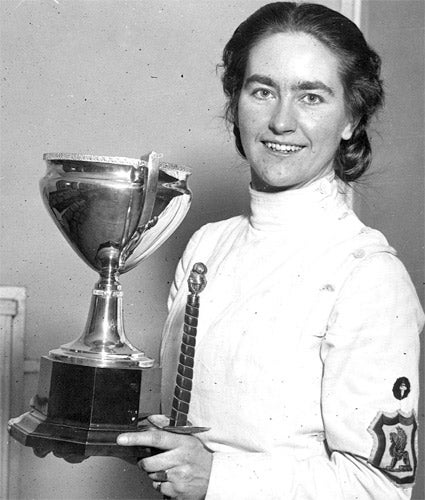Dorothy Knowles: Academic and leading authority on French literature who was also a champion fencer

Dorothy Knowles was a woman of immense talent and charm who excelled in many fields. A respected academic and authority on French 20th-century theatre, she was also a talented dancer and musician as well as a champion fencer.
Known to her friends as Diana, she was born in 1906 in Johannesburg where her father was a mining engineer. Following his death in 1911 her mother brought her to Leeds in 1912 to sort out the family's financial affairs. Prevented from returning home by the outbreak of the First World War, she attended the Notre Dame School and Leeds University, where she gained a BA in French in 1928. This was followed by postgraduate study at the Sorbonne. The research she did there formed the basis of her first two published works: La Réaction Idéaliste au Théâtre depuis 1890 and The Censor, the Drama and the Film (both 1934).
These were followed by French drama of the inter-war years 1918-39 (1967), which remains to this day essential reading for students of French theatre. During the 1950s she became acquainted with the works of avant-garde playwrights such as Eugene Ionesco and Samuel Beckett and produced articles and conference papers on the theatre of the absurd, always stamped with her uncompromising opinions. How she enjoyed it if a fellow scholar disagreed; a furious debate would ensue. For more than 30 years she taught French at Liverpool University where her kindness was legendary – some of her students kept in touch with her to the end of her long life – and she directed student productions that attracted audiences from all over the region.
As a child Diana Knowles had been a talented dancer and had performed alongside Marie Lloyd and Lupino Lane. During her years in Liverpool, she gave one-woman dance shows in the Philharmonic Hall. She also excelled at fencing and in 1936 started the Liverpool University Fencing Club, organising an open foil tournament, only the second provincial fencing competition in the country. This was an event she was to win many times.
In 1948, she won the Leamington Easter tournament and the following year was elected first chair of the Amateur Fencing Association's Northern Section, which won the first inter-section tournament, the Winton Cup, in 1950. She later became a prominent member of the London Fencing Club. In 1966, aged 60, she once again reached the final of the Liverpool tournament and two years later she was still accumulating enough points from the three senior British competitions to be ranked among the top 20 of Britain's women foilists. She also took on all-comers at the Dynamo Fencing Club in Moscow in 1965 and won the Gisor Challenge in France. Her remarkable achievements continued until she was in her 70s.
During the Second World War Knowles, like many academics, visited military bases in Great Britain where she provided entertainment with her solo dance show, and valuable insights into French life and culture. Such information was particularly useful to young pilots who faced the possibility of being stranded in France.
With her husband, John Stephenson Spink, she visited the Soviet Union frequently from the 1930s until the 1980s; they both lectured at Moscow and Leningrad Universities and broadcast on state radio. The Spinks were committed to fostering Anglo-Soviet cultural exchanges, and through the auspices of the Society for Cultural Relations with the USSR, they brought to Britain such prominent Soviet artists as the composer Aram Khachaturian and cellist Mstislav Rostropovich.
Retirement was an alien concept to Knowles. On leaving Liverpool she continued to teach postgraduate students as an Honorary Research Fellow at Bedford College, University of London. She was still in her post when Bedford College amalgamated with Royal Holloway College to form Royal Holloway and Bedford New College in 1984.
Now able to spend more time in France indulging her passion for avant-garde theatre, she became especially interested in the work of the playwright Armand Gatti, producing a pioneering study of his life and works, Armand Gatti in the Theatre (1989), and throughout her 80s she assisted with rehearsals of his revolutionary productions all over France. On her 90th birthday she presented a paper to the French studies conference, the annual forum for university teachers of French.
Diana Knowles was an outgoing and vivacious character and a great cook. During her husband's lifetime the couple's north London home provided hospitality and lively debate for visiting scholars. She remained physically and mentally active throughout her final decade and was still working on a translation of one of Gatti's plays until shortly before her death.
Dorothy Knowles, academic: born Johannesburg 28 March 1906; lecturer, Liverpool University 1934 -1967; Honorary Research Fellow, Bedford College, University of London 1967-1984; Honorary Research Fellow, Royal Holloway and Bedford New College; married 1940 John Stephenson Spink (died 1985); died London 10 November 2010.
Join our commenting forum
Join thought-provoking conversations, follow other Independent readers and see their replies
Comments